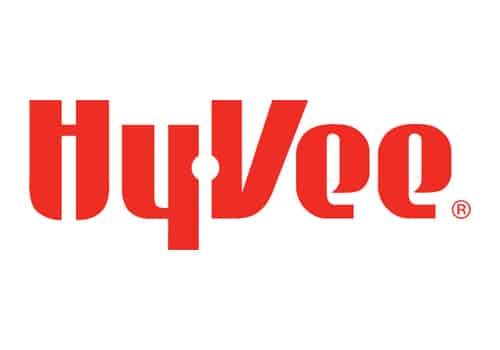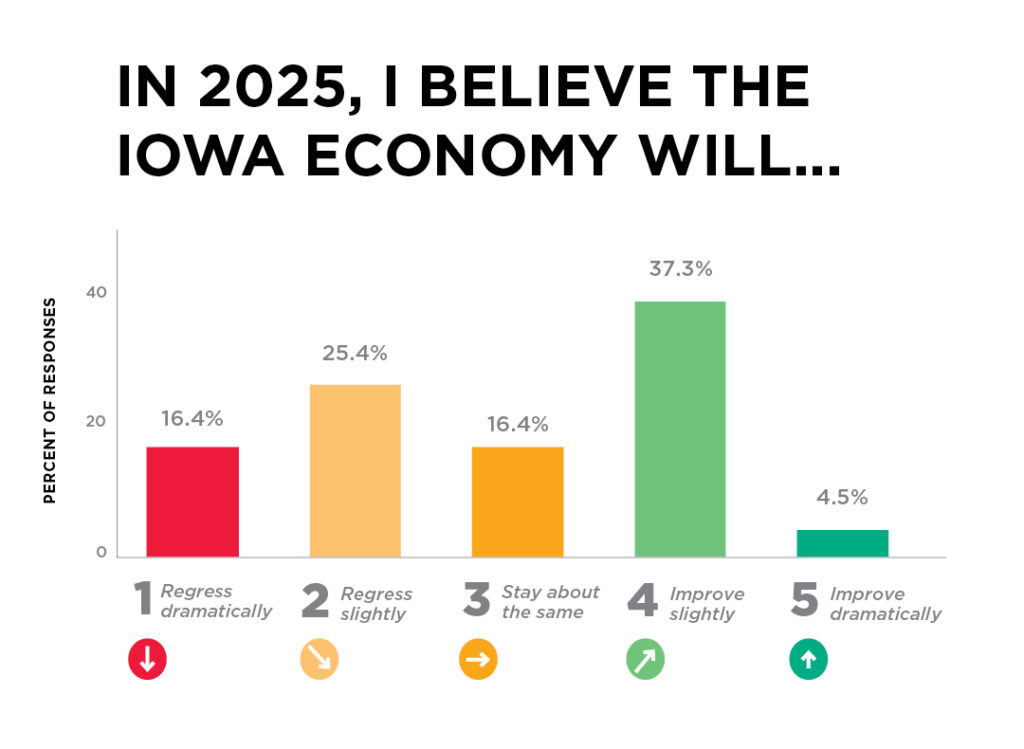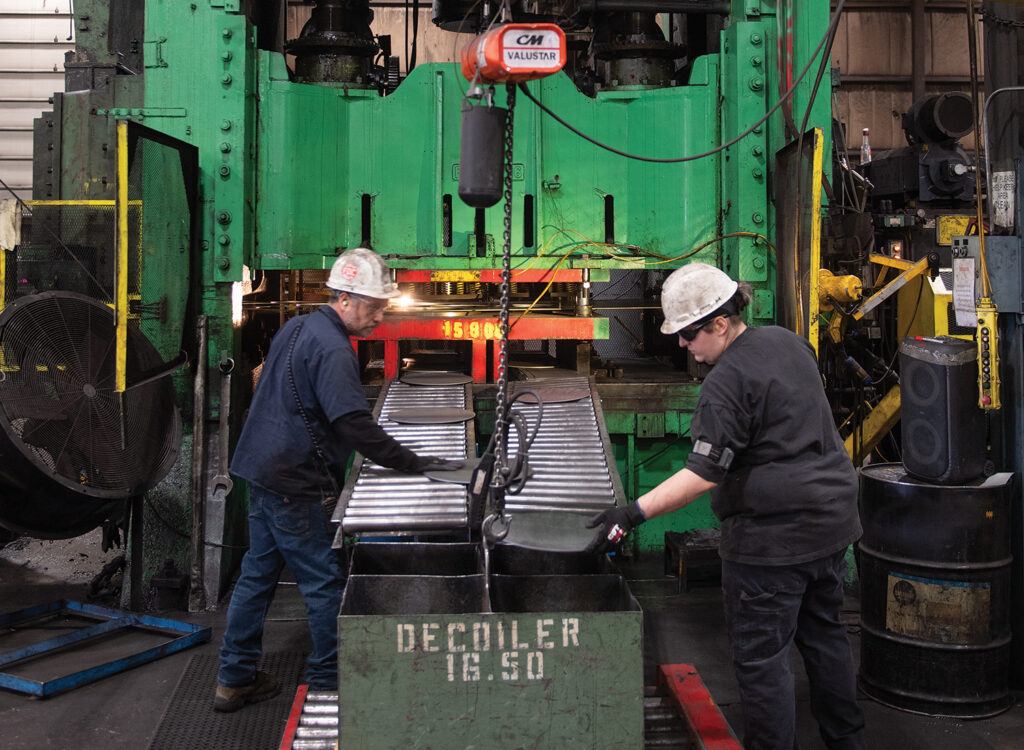Leaders Survey 2015

BUSINESS RECORD STAFF Aug 14, 2015 | 11:00 am
35 min read time
8,267 wordsBusiness Record Insider, Economic Development, Opinion, Retail and Business
– Chris Conetzkey, editor of the Business Record
Table of contents
Des Moines Water Works lawsuit
Health of the Central Iowa business community
Should DART continue to pursue bus rapid transit?
Biggest issue facing Iowa businesses right now
How optimistic are you about the job market outlook?
How easy would it be for you to find a new job?
Have you worked with someone who is transgender?
Rate the effectiveness of our political leaders.
Should Des Moines continue to allow food trucks?
What type of food truck would you start?
Will health care reform will be a positive thing?
Changes by affordable health care law have been …
How worried you are about online data security?
Which public Iowa-based company would you invest in?
How many hours per week are you working?
How stressed are you feeling at work?
How important is the growing tech start up scene?
Will driverless cars be used by 2030?
Do you believe the Des Moines Water Works lawsuit against the three upstream counties will result in a long-term improvement in water quality for greater des moines?
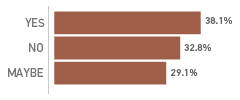
CEO, Hubbell Realty
Real Estate & Development
The lawsuit heightens the awareness of the water quality issue across the state. This is a statewide problem that needs to be addressed at our state level. The increased sales tax would go a long way to solving the problem, and the people of Iowa have voted to increase our sales tax for this purpose.
Yes – Mike Schreurs
CEO, Strategic America
Sales & Marketing
It serves as a catalyst for action. The lawsuit will likely spur environmental solutions that may have been delayed. That said, the unexpected consequences of a rural-urban or DSM/rest of Iowa divide will remain for some time unless addressed as part of the solution.
Yes – Todd Ashby
Executive Director, Des Moines Area Metropolitan Planning Organization
Transportation
Change is needed in how the state deals with its storm water and land management practices. This lawsuit will at least get people talking to each other and find some resolution or the start of a resolution — I hope.
Yes – Mike Carroll
Vice President of Business Development, Henning|Paric
Real Estate & Development
Not because of the lawsuit, but because of the dialogue it created.
Yes – Gerard Neugent
President/CEO, Knapp Properties Inc.
Real Estate & Development
It is my hope that it bring water quality issues into focus and bring all
stakeholders together to resolve these issues. The key is funding, and this lawsuit may be a catalyst to pass the 3/8 sales tax to fund the trust fund for water quality.
Yes – Hannah Inman
Inman Consulting
Sales & Marketing
The state has consistently cut funding for the exact voluntary programs the agricultural industry is touting as working. Unless we have consistent, reliable funding for conservation, the lawsuit is
the only action with reliable outcomes.
No – K. Stinson
Owner, Northwestern Lumber
Retail & Business
I applaud the Des Moines Water Works for their effort, but I do not trust the legal system to do the right thing by supporting this clean-water initiative. Too much corruption in the system.
No – Patrick Dix
Senior Public Relations Manager, Shazam
Banking & Finance
The attorneys will make a lot of money off of this. But true change has to come from the farmers themselves, and more regulation is NEVER going to work. It’s about a change in culture.
No – Mark Clark
President, Electronic Engineering Co.
Retail & Business
If successful, in the future St. Louis, Memphis, New Orleans will be suing DMWW for discharge. Its water as “not good enough.” Lawsuits are rarely, rarely the answer. The only winners: lawyers and legal fees.
No – David Presler
Chief Instigator, Results Unlimited
Sales & Marketing
Lawsuits make enemies; they don’t necessarily fix problems. Factions need to work together for common-good goals. We don’t need any bullies in that process.
No – Tom Leners
Executive Director, Madison County Development Group
Economic Development
The lawsuit is a vanity play for the board. Cover for the rate increase they are pushing through. I believe the lawsuit could cause the reverse of what it seeks.
No – Elliott Smith
Executive Director, Iowa Business Council
Economic Development
This is the wrong tack to take for Des Moines. It only feeds ill will and resentment against the metro. The damage has been done by Water Works, though. Time to find/negotiate a compromise.
Maybe – Larry Zimpleman
Chairman and CEO, Principal Financial Group
Insurance & Investments
Hard to see that a lawsuit is the path to go. Hopefully all parties will sit down and begin discussions on ways to manage water quality in the future. I would hope that was the purpose of the D.M. Water Works from the start.
Maybe – David Stroh
Principal, Wolin Mechanical Electrical Contractors
Real Estate & Development
I disdain taking the litigation approach, but maybe that’s what is needed for the catalyst. I went to a Cubs game last night and saw multiple ads regarding how farmers truly care about our water presented by an association, but no factual data was presented. It’s a start.
Maybe – J. Scott Raecker
Director, Robert D. and Billie
Ray Center
HR & Education
I would prefer to see a collaborative resolution to the issue, rather than a legal process resolution. The legal process will have unintended consequences and costs that will negatively impact relationships and human capital across Iowa.
Maybe – Robert Palmer
Government Affairs & Legislative Counsel, Iowa League of Cities
Law & Government
This lawsuit could end in several ways. The best part about it is that it has started a much needed conversation. Water quality is an issue that many cities and states are facing. From the Great Lakes to the Gulf, water quality is an issue that will need to be addressed. Starting a conversation is important. In this case, Bill Stowe has forced the conversation. I think it will force innovation and bring more people to the table. Examples of this already happening can easily be found in The Des Moines Register. Every week there seems to be an article discussing the issue. We have seen articles talking about the League of Cities developing a nutrient trading program, Cedar Rapids working with farmers upstream, and the Des Moines Partnership trying to join in as a mediator.
Editor’s Note:
Yes – I suspect if I had phrased the question as “Do you think Water Works should have sued,” we might have had a split leaning more toward ‘no.’ But no matter which of the three camps readers fell in, the common vein in responses was that most didn’t like the idea of having to settle this in court. Yet, as many readers in the ‘yes’ and ‘maybe’ camp pointed out, perhaps it was necessary in this instance and that the silver lining is that the lawsuit jump-started the community as a whole to have a conversation about water quality issues. Those in the ‘no’ camp might have wished for the conversation but worried about the damage done in rural vs. urban relations. My answer doesn’t imply I think Water Works should win or lose the suit. My answer of ‘yes’ tends to put faith in my belief that this is a conversation we need to have and one we wouldn’t be having had Water Works not sued. I also have faith that in the end, the rhetoric from both sides will subside and we’ll ultimately come to a better understanding of this issue that will guide the many decisions, conversations and solutions that we simply must have.
Rate the overall health of the Central Iowa business community
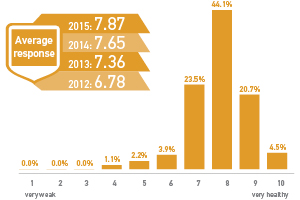
President, UnityPoint Health Foundation
Health & Wellness
DSM downtown is exploding, new housing units, business expansion. Western communities continuing to grow, and the east side — both downtown and farther east in Altoona, et al. — population is growing as well as businesses.
9 – Tyler Brady
Account Executive, CoStar Group
Real Estate & Development
Commercial real estate companies, appraisers and banks have a very positive outlook on the economy right now.
8 – Susan R. Hatten
Senior Consultant, Strategic Partnerships, Holmes Murphy
& Associates
Insurance & Investments
It is clear that the future is bright for business and economic growth in Central Iowa. With our largest industry segments being insurance, advanced manufacturing and agriculture, we stand to gain even more momentum in the foreseeable future.
6 – Michelle Book
Director, Community Relations, DuPont
Tech & Innovation
Our economy is driven by agriculture. With the recent downturn of the ag economy, farmers have fewer dollars to spend, and the impact will be felt by local business. However, the commodities correction has plateaued and there are bright days ahead.
4 – Alba Perez
Executive Officer Latino Affairs,
State of Iowa
Law & Government
Many minority business are still struggling without access to opportunities or to culturally appropriate business services in the public sector. For instance, the SOS refuses to assist some non-English-speaking individuals. No language access to many mechanisms to assist immigrant entrepreneurs.
4 – Chris Frantsvog
Public Health Planner, Polk County Health Department
Health & Wellness
The lack of affordable housing and a living wage is making economic prosperity impossible for many.
Mary’s Answer:
7 – Employment is expected to sustain or increase, and steady or increased sales and capital spending is expected.
Editor’s note:
8 – This is the fourth straight year the average has increased. As far as the distribution goes, there is a noticeable shift. It seems many of the voters who had been lukewarm in previous years (voting 6 or 7) finally felt this was the year to announce their confidence. A majority (44 percent) of the voters chose 8, which was the same as last year. However, 25 percent voted either 9 or 10, compared with 15 percent last year, while 27 percent voted 6 or 7, compared with 37 percent last year.
True or False: DART should continue to pursue bus rapid transit.
True – 80.4%
False – 19.6%
TRUE – Rick Tollakson
CEO, Hubbell Realty Co.
Real Estate & Development
This is an amenity that would improve access for our workforce to our businesses.
TRUE – Andrea Metzler
Head of Travel and Events, Real HQ
Tech & Innovation
With so many new apartments/condo buildings in the works and set to open within the next couple years, we’re going to see A LOT more people in the downtown area. We can build tons of parking garages OR we can build a downtown that allows people to give up cars by bringing in more grocery/retail options and creating a solid and reliable transit system. Fewer cars on the road will create a much more beautiful downtown.
TRUE – Lloyd VanderKwaak
President/CEO, ChildServe
Health & Wellness
We must continue to make incremental investments in public transportation because our current road system is incrementally becoming overburdened due to growth. We need to expand rapid transit between Ames, Ankeny and DSM.
TRUE – Todd Ashby
Executive Director, Des Moines Area Metropolitan Planning Organization
Transportation
BRT provides another service option that currently doesn’t exist in the metro and will attract other professionals and firms to the DSM region. Additonally, along the route BRT has shown to provide a large return on investment
to the surrounding area.
TRUE – Elliott Smith
Executive Director, Iowa Business Council
Economic Development
Not just bus rapid transit, but all rapid transit options, e.g., tram, street car, rail.
TRUE – Christopher Diebel
Managing Director of Public Affairs, LPCA Public Strategies
Sales & Marketing
Progressive cities that want to thrive well into the future require a robust public transit system. It is important to start building this infrastructure now and proactively grow annually into our surrounding communities. The city of Des Moines cannot do it alone. We need our suburban partners to help lead the way if we intend to be a first-class metro for decades to come.
TRUE – Dave Schwartz
President and CEO, West Des Moines Chamber of Commerce
Economic Development
Anything we as a community can do to increase the accessibility and efficiency of public transportation absolutely has to be explored and pursued.
TRUE – Jake Christensen
President, Christensen Development
Real Estate & Development
Our region is competing with the larger metropolitan areas, and we need to provide the same options for people. This will allow us to increase density in the areas where we have already paid for infrastructure. The cost of our roadways is subsidized, and so BRT looks expensive. However, if the true cost of driving were published, it would be a more accurate discussion. Transportation costs are the second-largest part of a person’s budget, after housing.
TRUE – Steve Cruse
VP, Iowa Business Growth Co.
Banking & Finance
If they can support the increased cost with increased revenue and no tax support, I’m all for it. Otherwise, make what they are doing today more efficient.
FALSE – Terry Myers
Principal, Business Edge LLC
Manufacturing & Logistics
As long as there is space, people will live out in the suburbs and drive their own vehicles to work. … The cost of daily transportation and parking and the time to commute are not a burden.
FALSE – John Kirby
President, Kirby Enterprises
Culture
Nobody needs to ride the bus, because we have plenty of wide roads, plenty of cheap parking. Bus rapid transit only works in very dense populations. DART should concentrate on improving service to and from the suburbs before we put an unnecessary extra bus service on the road.
FALSE – Josh Maurer
CFO, Library Binding Service Inc.
Manufacturing & Logistics
Mass transit is never going to work in Iowa, because the cost of car ownership is so low. Mass transit will remain used only by those for whom it is EXTREMELY convenient or those who have no other choice.
FALSE – Randal Helm
Chief Financial Officer, Baker Group
Real Estate & Development
I think that the population studies should justify it. It should not be based on a gamble that investments will come after it is in place.
FALSE – Jim Harken
Project Manager, Iowa State University Extension and Outreach
HR & Education
I think they need to bolster their semi-regional efforts. More buses from the population centers as opposed to quick transit in the downtown of the metro. A link to Ames would be solid. A link to Marshalltown would be helpful. More bus service to Adel would help cut the need for all the cars coming in on Hickman.
FALSE – Jeff Hatfield
VP, Graham Group
Real Estate & Development
Add more buses? Yes. Expand DART’s reach? Yes. With those relatively inexpensive additions, they can remain flexible and nimble without breaking the bank. There is already a Des Moines vs. suburbs struggle regarding DART, and rapid transit would push that conflict over the edge.
FALSE – Mark Joyce
Owner, Joyce Consulting Inc.
Law & Government
I do not think we have the population density to make it economical. I don’t think having it will speed growth at all. We have a difficult time funding the transportation system we have now. I don’t know how we make it work without it costing more than it turns out to be worth.
FALSE – Kevin Foley
Executive Director, Des Moines International Airport
Transportation
DART may need additional subsidies just to survive as is. Any metro area this size must have public transportation. Dart should figure out how to provide that efficiently first, and look to expand.
Editor’s note:
YES – But, I’ll hang my answer on the word “pursue.” I think the discussions we are having are important and the exploration of BRT needs to continue.What I will say is that I am a big believer in public transportation. Although one of the common arguments against BRT — and other forms of public transit in Des Moines — is that it’s so easy and cheap to drive in Des Moines, investing in public transportation is a long-term proposition with long-term benefits meant to curb long-term growth challenges. I think that’s ultimately at play here specifically for BRT. It’s hard as a region to get uniform agreement to invest in something that in the short term benefits a smaller portion of that region. Would you save that much time using BRT today? Do we have a huge traffic congestion problem already? The answers are probably no — right now, anyway. The reality is the tangible benefits for the region are likely farther down the road and perhaps softer in nature. The concerns raised by those in the suburbs and many who voted “false” in this survey need to be heard, though: the cost, questions about DART’s financial health, route questions. But while the issue flares and alternatives are discussed, I think it’s important to see the common theme expressed even by those against BRT: better transportation options for the future region. If nothing else, the effort to bring BRT to Des Moines has spurred conversations that otherwise might not have been so passionately raised. And long-term, these discussions, regardless of the fate of BRT, will have a positive impact on addressing transportation needs in the future.
The biggest issue facing Iowa businesses right now is…
Larry Zimpleman
Chairman and CEO, Principal Financial Group
Insurance & Investments
Attracting and retaining world-class talent. Iowa’s population is simply not growing fast enough.
Suku Radia
CEO, Bankers Trust Co.
Banking & Finance
We need to invest in the future of education. We are falling behind!
Zachary Mannheimer
Executive Director, Des Moines
Social Club
Culture
Finding the leaders and workforce of the next generation. What are we doing to attract and retain them, and how are we teaching them about civic pride and responsibility?
Christina Moffatt
CEO, Founder, Regional Director, Crème, Iowa Small Business 10
Retail & Business
With the unemployment rate so low, which is great for Iowa but limits available candidates in the job pool for employers who need to hire.
Hal Chase
President, Farmers & Merchants Bancorp
Banking & Finance
Growing disparity between exec. salaries and those of the front-line rank and file.
Tony Timm
CEO, Central Iowa Shelter & Services
Culture
Availability of affordable housing.
Clint Dudley
Owner, Shade Tree Auto
Retail & Business
A national misconception of our state and metro being technologically deficient.
Sara Kurovski
Mayor, Pleasant Hill
Law & Government
Water. Everything from regional water sources to water quality issues.
David J. Huser
Executive Vice President, First National bank
Banking & Finance
The risk of higher interest rates.
Mark Imerman
Senior Consultant, Regional
Strategic Ltd.
Economic Development
Building (not attracting) the necessary talent base. As we grow, we will always need to attract talent. Everywhere will. The advantage goes to those who also successfully build talent.
Mark Wyzgowski
Managing Principal, CliftonLarsonAllen
Banking & Finance
Succession/transition planning.
Michael Colwell
Executive Director, Entrepreneurial Initiatives, Greater Des Moines Partnership
Tech & Innovation
Failing Infrastructure, including roads, water, broadband, etc.
Mary’s answer:
Employer demand for middle-skilled workers and the lack of middle-skilled workers. 56 percent of the jobs available in the labor market are middle-skilled jobs, yet only 33 percent of the workforce has the skills and credentials for these jobs.
Editor’s note:
Iowa’s education system – I’ll get back to that in a second. More than 80 percent of the responses in one way or another represented worry and distress about Iowa’s workforce as the biggest issue. Be it attracting skilled workers, retaining them, training them, having access to them, or simply dealing with those pesky millennials. But I liked the approach of Mark Imerman (see above), who emphasized the need to build our talent base. I think that building that talent starts early in our schools and that we need to take a hard look at making a long-term investment in our future workforce. Iowa has fallen farther and farther from its former No. 1 ranking in education, and I can’t help but think some of our issues today are a result of that decline.
How optimistic are you about the job market outlook for your particular industry?
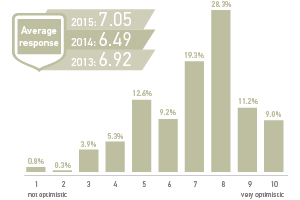
Executive Director, Cystic Fibrosis Foundation Iowa Chapter
Health & Wellness
I think we are so focused on young professionals that we are forgetting about the older primary workforce that we will need to keep businesses going into the future.
9 – Brian Hemesath
Managing Director, Global Insurance Accelerator
Insurance & Investments
Emerging technology has the opportunity to reshape the insurance industry, which will create new jobs that are highly engaging and rewarding.
8 – Brian Rickert
Partner, Brown Winick Law Firm
Law & Government
The number of law students is down significantly, while the demand for legal services is up. That’s a good combination for new graduates and one we have not seen for a long time.
5 – Bob Wersen
President, Interpower Corp.
Manufacturing & Logistics
Iowa has a limited workforce with little prospect of it expanding anytime soon. We have to hire for values, and train skills ourselves.
4 – Keith Gredys
CEO & President, Kidder Benefits Consultants Inc.
Insurance & Investments
Due to the nature of our business, we generally need to recruit nationally to find qualified staff for many of our key managerial and administrative positions.
1 – Rick Tollakson
CEO, Hubbell Realty
Real Estate & Development
Our unemployment rate is dangerously low. We need to increase the size of our workforce if we are going to continue to grow as a community.
Mary’s answer:
8 – What we are seeing is that an increasing number of millennials are seeking intrinsically rewarding careers and in many cases feel they can find those in the nonprofit sector.
Editor’s note:
5 – As a whole, this question shows that readers are feeling more confident about their industries, though the pesky access-to-talent issue remains a drag on this number. Many of the best and brightest young journalists have left the profession for better-paying jobs in better environments, during a time when newsrooms around the country are shrinking and cutting experienced newsroom staff. I’m very fortunate to work at a profitable media company where I’m valued, compensated and treated fairly — luxuries many of my peers don’t receive. So like most of our respondents, lack of access to talent is what drives my answer low, but I do have hope for the long-term future of the journalism industry. If I broaden my industry to be “communications,” I am much more optimistic.
Rate how easy or difficult do you feel it would be for you to find a new job with comparable compensation given today’s job market.
Readers voted on a 1-10 scale, 1 being very easy, 10 being very difficult.
Average response:
2014 – 5.60
2015 – 6.09
Editor’s note:
7 – This is the second year we asked this question, and in general people are more confident about their ability to find a job in today’s market. The point of angst for most is the clause about “comparable compensation.” Many talked about the size of our market and the lack of executive-level positions as a reason it might be tougher. For me it would depend on how far I wanted to stray from traditional media companies in order to continue receiving comparable compensation. (See my response to the industry outlook question.) Then of course we have readers like Larry Zimpleman bringing the overall average down — Larry responded with a 1. I’m sure demand for Larry wouldn’t be the issue here. But just in case, Larry, I’m sure we could find a place for you here at the Business Record. You’ll just have to work with us on the compensation piece.
Do you currently, or have you in the past, worked with someone who is transgender?

Yes, definitely
Editor’s note:
I think so, but I’m not sure – My interest in this topic was piqued a few months back at an Iowa Women in Architecture event titled “Tackling unintentional bias,” at which one of the panelists, who identified as transgender, shared her challenges in the workplace. It made me feel that perhaps this has been a blind spot for workplaces. One of the most frequently cited studies says that about 0.3 percent (3 in 1,000) of the population is transgender, but getting an accurate count can be incredibly difficult, for a variety of reasons. Fear of reporting, lack of reporting options on the census, disagreement about what it means to be transgender, and even reluctance of one to identify as transgender. Here’s the definition: An umbrella term for people whose gender identity and/or gender expression differs from the sex they were assigned at birth. The term may include but is not limited to transsexuals, cross-dressers and other gender-variant people. Facebook last year added 50 custom gender identifications, and the topic as a whole is being talked about much more openly. And if 16 percent of our audience has definitely worked with someone who is transgender, it leads me to believe that perhaps some of us in the unsure or definitely not categories actually have. For a really good read on the challenges of understanding the size of the transgender population, check out this story (http://53eig.ht/1zrIXrs) at one of my favorite websites, FiveThirtyEight.com.
Rate the effectiveness of our political leaders.
Readers voted on a 1-10 scale, 1 being not effective at all, 10 being very effective
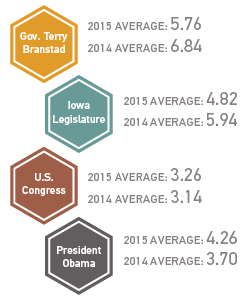
Executive Director, Iowa Business Council
Economic Development
We are fortunate in Iowa to have state agencies and elected legislative and congressional leaders who generally focus on working together to achieve mutually beneficial outcomes. They could serve as role models for many other states and partisans in D.C. who hold positions of authority.
3 – 3 – 3 – 3 – Paul Tyler
Attorney, Dickinson, Mackaman,Tyler & Hagen, P.C.
Law & Government
All could do much, much better if they acted in a cooperative and congenial manner rather than the winner-take-all attitude that seems
to be the pervasive attitude.
4 – 4 – 4 – 4 – Deanne Bryce
Civility and Leadership Programs Coordinator, Wallace Centers of Iowa
HR & Education
Voters need a choice that communicates our desire for less partisan behavior on both sides in order to get things done.
10 – 1 – 1 – 1 – David Casten
President, Barton Solvents Inc.
Manufacturing & logistics
Career politicians should all be removed. Term limits, two four-year terms for reps and senators.
4 – 2 – 2 – 6 – Thomas Ahart
Superintendent, Des Moines Public Schools
HR & Education
My sense of our state and national elected officials, as a body, is that they are more interested in ideology and less interested in serving their constituents. They are more concerned with being outwardly contentious with their counterparts across the aisle than in solving policy issues.
3 – 3 – 3 – 7 – Denise Rathman
Executive Director, National Association of Social Workers, Iowa Chapter
Health & Wellness
I wish that Gov. Branstad, the Iowa Legislature and the U.S. Congress would think in terms of long-term investments, not just one-year budgets. President Obama seems liberated by being a lame duck.
Editor’s note:
There certainly was some movement this year in the averages. Branstad dropped more than a full point, as did the Iowa Legislature. The U.S. Congress and President Barack Obama both ticked upward, but still both lag behind our local government in terms of perceived effectiveness. A look through the comments didn’t provide much guidance to any particular reasons why this would be the case, but it did make it abundantly clear how dissatisfied as a whole the business community is with its elected officials.
Should the City of Des Moines continue to allow food trucks at the conclusion of the food truck pilot program in October?
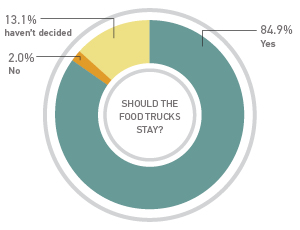
Managing Director of Public Affairs, LPCA Public Strategies
Sales & Marketing
Food trucks spur creativity and diversity in our culinary community. They allow entry-level entrepreneurs who often do not have capital for costly brick-and-mortar facilities an opportunity to pursue their dreams. These trucks also offer viable outlets for niche food offerings that would never be commercially viable in a permanent outpost.
Yes – Gerard Neugent
President/CEO, Knapp Properties Inc.
Real Estate & Development
Food trucks are a very desirable amenity to our emerging downtown. It’s a quality-of-life issue, both perceived and real.
Yes – Michael Sadler
Assistant Vice President, CenturyLink
Tech & Innovation
The food trucks provide a nice option for downtown workers looking for a quick meal. I believe the popularity of the trucks speaks for itself in terms of whether they should remain beyond the pilot program.
No – Jeff Hatfield
VP, Graham Group
Real Estate & Development
It’s “big city” and trendy, but it hurts brick-and-mortar restaurants that are employing people, paying real estate taxes, etc.
No – Robert Link
Senior VP, Corporate Secretary, EMC insurance companies
Insurance & Investments
I think this detracts from investment into the business community. We need occupancy of buildings. Also, sales tax and property tax assessment would be improved. Less expense of trash cleanup.
Haven’t decided yet. – Dick Edwards
SVP Credit Risk Management, US Bank
Banking & Finance
I like the idea … but I question if those businesses with what I would speculate to be the higher cost of permanent locations become disadvantaged with this program if it becomes a big hit and their prospective customers begin to use the truck owners more and more.
Mary’s answer:
Yes – It builds the core of our community, assists very small business, allows for entrepreneurship and if successful it may lead to a permanent site.
Editor’s note:
Yes – I understand the concerns expressed about fairness to brick-and-mortar restaurants, but I feel the positives and the potential for helping develop future brick-and-mortar restaurants outweigh the negative. I do wish the trucks were allowed to serve late-night near Court Avenue — outside of Fong’s, there aren’t many restaurants serving at 2 a.m.
If you owned a food truck what type of food would you serve?
Top 10 reader-submitted food trucks Chris wants in Des Moines:
Specialty and Chicago-style hot dogs – David Chapman
Investment Analyst, BTC Capital Management
Editor: Playing to my roots.
Pork tenderloin sandwiches – Mark Millsap
Financial Adviser, VantagePointe Financial Group
Editor: Somebody tell Prairie City-based Goldie’s to get a truck down here.
Fresh baguettes filled with ham and cheese – Croque Monsier
Melodee Pomerantz
Executive Director, Cystic Fibrosis Foundation Iowa Chapter
Fried Chicken and Waffles – Christopher Diebel
Managing Director of Public Affairs, LPCA Public Strategies
Editor: Yes, please.
Jamaican beef patties – Michael Sadler
Assistant Vice President, CenturyLink
Editor: No idea what this is, but sounds good.
Wings – Tony Dickinson
VP of Marketing, Wells Fargo
Editor: I’m always on the lookout for great crispy wings.
Lobster rolls and Frito pies – Gil Sanchez
Managing Partner, Jani-King of Iowa
Winner, Winner, Bacon Dinner – Brett Millsap
Financial Advieor, VantagePointe Financial Group
Editor: Think there’s actually a rule in the food truck code that requires a bacon truck, right?
Meatloaf – Marla Lacey
Executive Vice President, General Counsel, Homesteaders Life Co.
Editor: A million ways to make a meatloaf, and I want to eat them all.
Awesome salads with fresh ingredients – Denise Rathman
Executive Director, National Association of Social Workers Iowa Chapter
Editor: Since we’re going for the healthiest state recognition, I figure we better balance the bacon out with some healthy salads.
And … four unique ideas that are either genius or crazy – or both
Dog food. A pet food truck would be fun! – Michael Morse
Morse Retail Realty Inc.
Beer on a stick – Kevin Ridout
Vice President, Commercial Lending, American Trust & Savings Bank
Hugs! Check out Tim’s Hugs, run by a man with Down syndrome. Mandi McReynolds
Director, Community Engagement and Service-Learning, Drake University
Cricket burgers – John Kirby
President, Kirby Enterprises
Mary’s answer:
“Pickle Little, Talk a Little,” after the song in “The Music Man,” and I would serve pickles in new and creative ways!
Editor’s note:
Walking Tacos. Imagine the possibilities beyond the classic Doritos and ground beef! Pulled pork, steak, fish, shrimp, and different types of chips! Tamara Kenworthy, president of On Point Strategies, had the same idea. Perhaps we need to raise some capital!
True or False: Long-term, health care reform will be a positive thing for businesses.
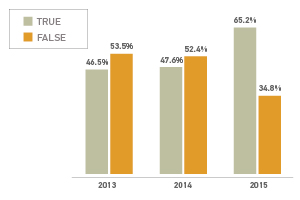
President and CEO, Delta Dental of Iowa
Insurance & Investments
I believe that health care reform and the Affordable Care Act are two different things. A shift to more transparency in costs and a focus on outcomes will be better for businesses and employees.
TRUE – Denny Linderbaum
President, UnityPoint Health Foundation
Health & Wellness
Better access to health means healthier people in the long run. The expansion of Medicaid in Iowa was an excellent decision.
FALSE – Mark Weinhardt
Partner, Weinhardt & Logan, P.C.
Law & Government
The government-subsidized marriage of health insurance with employment, commenced decades ago, is a bad idea that insulated consumer health insurance choices from normal market forces and has driven up the cost of health care. To the degree that “reform” perpetuates that model, it is a negative thing for businesses and consumers alike.
FALSE – Larry Zimpleman
Chairman and CEO, Principal Financial Group
Insurance & Investments
Health care reform will reduce the choices you have in your medical plan and will greatly reduce the number of health insurance companies competing in the marketplace. It could have a positive impact on the quality of care that you receive.
FALSE – David Lind
President, David P. Lind Benchmark
Health & Wellness
What happens when you cover more people under an already costly and inefficient health care system that is harmful to an unacceptable percentage of patients? A more costly system that will only harm more people. Quality care with safety practices has been inadequately addressed in the ACA. With that said, we can now expose this non-system for what it is and eventually make incremental improvements using the ACA as the platform.
Mary’s answer:
UNCERTAIN – Not sure on this one. Local hospitals are reporting fewer charity cases, and more people are insured, but they don’t necessarily have better access because the deductibles and copays are too high for some people to afford.
Editor’s note:
TRUE – The big surprise here is a massive swing in votes in favor of “true.” The past two years it was just over half of voters who chose “false.” Now two-thirds of voters picked true. Perplexing to me is the reason for the big switch. A look through responses found many of the same rationales as in past years, with the most common vein being that reform will eventually be good, but perhaps not in the current form of the Affordable Care Act. True-or-false questions force people to one side of the line or the other. Perhaps, even though it had been near 50-50 in the past, there was a big portion of those on the false side that were actually a lot closer to the line than a true-or-false question allows us to see.
So far, the changes brought on by the affordable health care law have been …
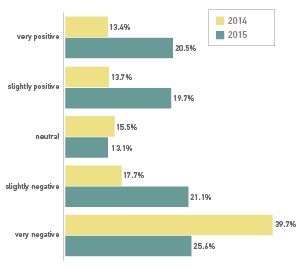
President/CEO, ChildServe
Health & Wellness
There were some immediate provisions that impacted the clients we serve:
1. Eliminated major medical limits.
2. Allowed young adults to stay on their parents’ insurance to age 26.
3. Expanded health insurance access to the uninsured.
These benefits come with additional complexities, but we can work those out.
Slightly Positive – Mike Simonson
President, Simonson & Associates Architects LLC
Real Estate & Development
It didn’t go far enough. If it’s not the ideal solution, then let’s correct it. Relying on emergency rooms for basic health care for those members of society of limited means is not the solution.
Neutral – Abid Talic
Area General Manager, Paramount Hotel Group
Retail & Business
I think we will need another decade to truly understand the impact of such change.
Slightly Negative – Mark Lyons
CFO, LMC Insurance & Risk Management
Insurance & Investments
Some aspects of the law are positive. However, the increased compliance responsibility on employers and the additional costs and fees are burdensome.
Very Negative – Terry Trosper
President, Advance Machine Technologies Inc.
Manufacturing & Logistics
Our cost of health care and administration costs continue to rise, while the quality and availability of health care has declined. I would like
to see true health care reform that gets the employer out of the equation.
Editor’s note:
Slightly positive – Again, like our other health care question, a big swing in the voting in favor of the law, though not enough to swing the majority. Last year just 27 percent of voters thought changes had been slightly or very positive, while 57 percent voted slightly or very negative. This year? 40 percent voted slightly or very positive, while 47 percent voted slightly or very negative. The biggest change happened in the very negative category, where the percentage dropped 14 percentage points. Still a number of things to shake out here, and with CoOportunity Health’s demise, I’m curious to see what type of rate changes are in store for next year and into the future.
Given the recent cyberattacks on businesses and individuals, rate how worried you are about online data security.
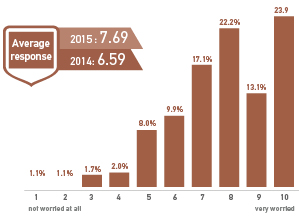
CEO, West Bank
Banking & Finance
Cyber crime is one of our nation’s fastest-growing industries. Pretty soon our federal government will want to tax and regulate it.
10 – Bill Sullivan
Market President-Central Iowa, Two Rivers Bank & Trust
Banking & Finance
This may be the greatest challenge we face in the world today, as everything in our lives today is run by a computer in some fashion.
9 – Rob Schweers
Communications Director, Iowa State University Office of the Senior Vice President and Provost
HR & Education
We need to continue expanding cybersecurity programs like the one at Iowa State. Professionals in this field will be in extremely high demand in the future (starting today).
10 – Jeff Rose
President & CEO, Community 1st Credit Union
Banking & Finance
I run a financial institution, and you can’t stop the attacks. The government can’t stop the attacks, either.
6 – Ted Heying
Data Specialist, Community Foundation of Greater Des Moines
Banking & Finance
It is more of a question of when, not if, we will be affected by a cyberattack. Worrying doesn’t make much of a difference; proactive preparation and damage mitigation does.
2 – Michael Sadler
Assistant VP, CenturyLink
Tech & Innovation
As cyberattacks increase, so does the innovation of companies that battle cyber crime. Cyber safety is a top priority as more and more business and personal activity occurs over the Internet. I am confident that those of us who rely on secure connectivity will be protected.
Mary’s answer:
9
Editor’s note:
9 – This question’s average response jumped by more than a full point. It appears another year of hacking headlines pushed respondents from the not worried side of the equation to almost entirely on the worried side. Last year 19 percent of respondents voted 1-4, while this year just 6 percent weren’t worried. In addition, the amount of worry increased. The proportion of people voting 10 increased to 24 percent from 10 percent last year. People are worried, and perhaps even more worrisome from looking at responses is a feeling of helplessness to a degree, and a realization things might get worse before getting better.
Taking stock: You have $10,000 to invest in one Iowa-based publicly traded company. The only hitch – you can’t sell your stock for at least 10 years. Which company would you invest in?
Casey’s General Stores Inc. – Steve Cruse
VP, Iowa Business Growth Co.
Banking & Finance
Excellent management with vision, track record and room to expand.
Rockwell Collins Inc. – Mark Joyce
Owner, Joyce Consulting Inc.
Law & Government
Commercial and military aviation are never going away, and there are many growth areas ahead. And, they do not have near the number of competitors that many on the list do.
KemPharm Inc. – Michael Colwell
Executive Director, Entrepreneurial Initiatives, Greater Des Moines Partnership
Tech & Innovation
Amazing technology with large growth potential.
NewLink Genetics Corp. – Brett Millsap
Financial Adviser, VantagePointe Financial Group
Insurance & Investments
With genetics, one new medication can change the world. The growth potential of NewLink is where I am putting my money.
Principal Financial Group Inc. – Keith Gredys
CEO & President, Kidder Benefits Consultants Inc.
Insurance & Investments
401(k) and investment-related services will continue to expand and/or they may be bought out.
Editor’s note:
Of the $3.4 million readers collectively invested, it was interesting to see about half those dollars go toward the safety and security of three large, established companies (Casey’s, Principal and Rockwell Collins). At the same time, though, the next three biggest investments made up 29 percent of the total but were in newer companies (NewLink Genetics, KemPharm and Renewable Energy Group) that were viewed as having high growth potential.
On average, how many hours per week are you working?
2015 – 49.6
Mary’s answer:
55 hours
Editor’s note:
50 – The average was up slightly from last year, but I do think answering this question gets tougher and tougher as we move toward a work/life fit, rather than a work/life balance. I might be in the office and at events for 50 hours, but often handle issues or do creative thinking when I’m not on the clock.
How stressed are you feeling at work?
On a scale of 1-10, 1 being not very stressed, 10 being very stressed

VP, Client Relations, Tero International
HR & Education
Everyone I talk to (professionals from all over the U.S.) is doing more with less. People are working 24/7 via cellphones and with technology. While it is a good thing, people do not have any idle time for creative thinking.
5- David Stroh
Principal, Wolin Mechanical Electrical Contractors
Real Estate & Development
Too much business, while it is a good problem, it is still a problem.
3 – Aryn McLaren
Director of Programs, Iowa Healthiest State Initiative
Health & Wellness
Do what you love and love what you do! Get up and move at least once per hour or buy a stand-up desk. You can find them for $35 on amazon.com.
Mary’s answer: 5
Editor’s note:
6 – Both stress and average hours worked were up from last year. But I wouldn’t read into it all that much, as the change was pretty small. In fact, if anything, what the distribution of stress shows is people moving toward the middle range (4-7). And a scan through most responses shows a healthy response to stress, with most acknowledging some stress as being good. Most who rated stress higher were doing so because they were busy.
How important do you think the growing tech start up scene is for the overall health of the Des Moines business community?
On a scale of 1-10, 1 being not important, 10 being very important
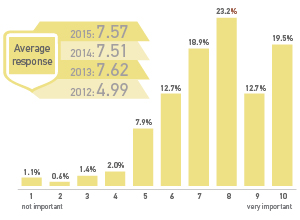
Chief Strategic Communications Officer, United Way of Central Iowa
Sales & Marketing
Youth, energy, enthusiasm and innovation are palpable in the startup world. That kind of excitement is inspiring to everyone in the business community, and spreads into the more traditional workplaces.
10 – Brian Hemesath
Managing Director, Global Insurance Accelerator
Insurance & Investments
Every line of business is impacted by technology and needs to invest in tech to remain a leader or stay competitive. The tech startup scene contributes to the DM business community in several ways, and talent recruitment/retention is one. The tech startup scene attracts the type of talent that wants to learn and be on the edge of what’s possible. I believe the tech startup scene is underutilized by the general business community and hope to be part of the effort to change that, both personally and through my work at the Global Insurance Accelerator.
6 – Bob Gates
President, Executive Resources Limited
Sales & Marketing
I think it’s good to have, but I don’t feel at this point it is extremely important. It could be in the future, but not right now.
10 – Spencer Shireman
Social Media Specialist, Wellmark Blue Cross and Blue Shield
Insurance & Investments
It’s partially what drew me back to Des Moines after college. It encourages innovation across industries and gives Des Moines a positive image as a
center for entrepreneurialism.
10 – Rebecca Hughes
Director, HR, Meredith Corp.
Sales & Marketing
The exposure and energy that the tech startup scene has brought to the Des Moines business community is priceless.
6 – Jana Rieker
PR and Communications Director, Trilix
Sales & Marketing
I’m on the fence with this. I’m delighted we celebrate entrepreneurialism; however, we spend a lot of time celebrating ideas and not actually making anything. Maybe that’s the point is to just spend time “thinking” of ways to improve, and eventually some GREAT things will come out of those think tanks.
5 – Nick Darrah
Vice President, Ord Enterprises Ltd.
Retail & Business
It is an exciting opportunity, but only a small part in a much bigger overall business community. It does provide more diversity to the area, which is always positive.
Editor’s note:
7 – I was curious to see if the closing of Startup City would have any impact on people’s perceptions. That doesn’t appear to be the case. In fact, I think it has been interesting to see that over the past year or so a number of tech/innovation efforts have swelled to fill that void: Gravitate, 1 Million Cups, the Global Insurance Accelerator and Square One DSM.
Choose the over or under: By January 1 of the year 2030, people will have the option and ability to legally utilize driverless cars for at least portions of their trips:
Under (this will happen) – 69.1%
Over (this won’t happen – 31.0%
UNDER – Max Farrell
Co-Founder/Chief Hustler, WorkHound
Tech & Innovation
As someone focused in the trucking industry, these vehicles are already operating with an auto pilot. With a truck driver shortage expected to increase to 240,000 in the next five years, freight hauling will rally around this because it has to.
UNDER – Clint Dudley
Owner, Shade Tree Auto
Retail & Business
We believe drivers will not only have the option, but there will be consideration for banning driving in most cases. Many vehicles have the technology in place for autonomous operation already. Working out the legal issues with accountability will
be our biggest hurdle.
UNDER – Todd Ashby
Executive Director, Des Moines Area Metropolitan Planning Organization
Transportation
Technology is almost there. The bigger issue will be getting people comfortable with the idea and the legislation passed to allow it.
OVER – Rowena Crosbie
President, Tero International Inc.
HR & Education
The technology is there. The legal and legislative implications are complex. Anything that requires an act of Congress is likely to sit on the drawing board for years.
OVER – Jeff Damman
VP, MetaBank
Banking & Finance
There will be enough accidents caused by hackers or bad programming that the politics will prevent driverless cars from happening.
Mary’s answer:
UNDER – Due to the developments that are currently happening, but it will be limited.
Editor’s note:
UNDER – I have to admit I have an agenda here. About four years ago I made a certain type of bet with a former reporter of ours. Don’t worry, no money is at play here, just a good old-fashioned slap bet. (Thanks, “How I Met Your Mother.”) The bet was that my kids — I didn’t have any at the time, and I still don’t — won’t need to drive. I’m betting on technology. He was betting on the bureaucracy that is the United States government. In the years since we made the bet I’ve had a number of wins as the technology has advanced. But I do have my doubts for many of the reasons identified below: Insurance questions, legal issues and cost barriers. Another concern seems to be safety. Not as it relates to the technology keeping cars out of harm’s way, but rather safety from hackers. While I think cybersecurity is one of the great challenges we face moving forward, I do find it interesting that when it comes to cars, people seem more worried about hackers than they do when they take a flight on a plane, or a ride on a train. I do think hacking should be a concern for autonomous cars, but I also think it’s a hurdle other forms of transportation will face as well. Ultimately I’m putting faith that the economic benefit will outweigh the hurdles. But forgive me if my wife and I hold off on having a kid for a few more years. That former reporter has a mean slap.





